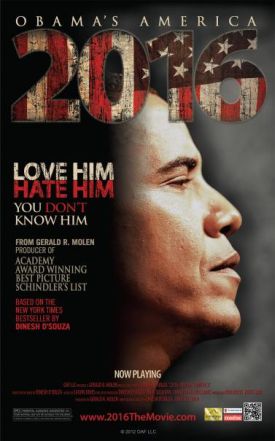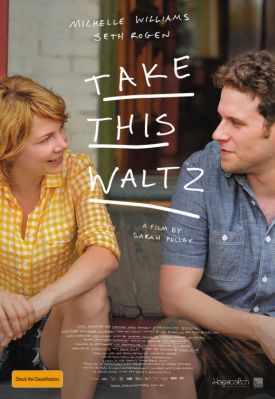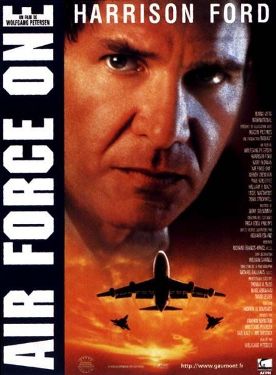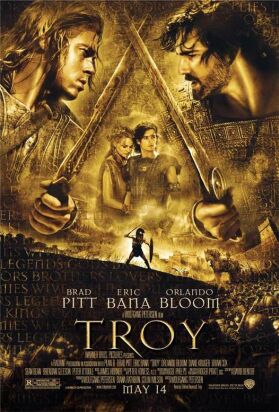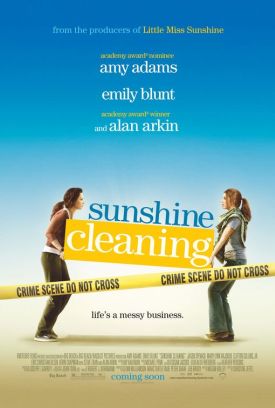2016: Obama’s America
Near the end of 2016: Obama’s America, Dinesh D’Souza — who is the principal on-screen presence and co-director (with John Sullivan) of the movie based on his book The Roots of Obama’s Rage — interviews the former Comptroller General David Walker as part of an effort to sound the alarm about our country’s ballooning debt. There is, as you would expect, an on-screen graphic, in fact a graph, stacking up President Obama’s massive $5 trillion in new debt in only three and a half years against the more modest contributions of his predecessors — though his immediate predecessor, George W. Bush, is lumped together with him for the convenience of making the point that these two presidents between them have piled up more debt than all their 42 predecessors combined. In any reasonably well-ordered democratic political culture this, you might think, would be scandal enough and to spare, but in our hyper-charged media environment today we have been mainlining scandal for so long that it apparently takes something a good deal more potent than looming bankruptcy to give us that longed-for high.
At any rate, Mr D’Souza’s movie certainly gives us the hard stuff, as it imputes to President Obama an agenda culminating in nothing less than the prospective destruction of the United States. The bit about the debt comes across almost as an afterthought. Too obvious, I guess. Instead, with the promise of mystery and intrigue, the hidden truth that only they can get at which is always so congenial to the movies, 2016 concentrates on finding the clues in Mr Obama’s not-quite-secret radicalism as to his secret agenda for his second term. It’s the secrecy which is meant to give the movie its kick. The tag-line is “Love him, Hate him: You don’t know him.” But of course we do know him — or we would if we took the trouble to look in to the publicly available record. The movie fills in the picture already made clear by the likes of Bill Ayres and Jeremiah Wright with the less well-known figures of Frank Marshall Davis and Roberto Unger, but the general outline of the President’s radicalism will come as no surprise to anyone whose reading goes much beyond that supplied by the mainstream media.
And therein lies the film’s justification, such as it is, for it gives those of us on the right who have long been alarmed by the anti-American assumptions of the American left and the extent to which they appear to be shared not only by America’s president but by his political party, a presumptive way to get around the media’s indifference and into the consciousness of the mostly politically inert masses. At least in his survey of Mr Obama’s intellectual influences, whom he cheekily calls his “Founding Fathers,” Mr D’Souza has an interesting story to tell and he tells it well. My fellow conservatives are already helping to make the movie a big and unexpected success at the box office, and there must be many who are not conservatives and who have had their eyes opened to one of the least attractive and most alarming features of the liberal world-view, which our President completely shares.
Yet I would urge them to treat these criticisms with a degree of caution. For the problem with the film lies in the surely overblown sensationalism necessary to sell us on the connection between a bunch of idiotic but essentially harmless armchair revolutionaries — as even Mr Ayres has become in his post-terrorist career — and what the President actually wants to do in office. By overhyping Mr Obama’s supposedly secret radicalism and his supposedly hidden agenda to bring America down from its position of world leadership, the film runs the risk of making us pay less attention than we should to the non-secret radicalism and the agenda we already know he has, which are both quite bad enough and the real reason he deserves to be defeated. Moreover, the movie is on much shakier ground when it attempts to make the case for the biggest influence on him of all, which is that of the long-dead Barack Obama Sr.
I, at least, was unpersuaded when an academic psychologist, Dr Paul Vitz, of NYU, was produced to confirm the importance of the Kenyan father’s absence to his infant American namesake and therefore, putatively, to explain the wholesale adoption by Barack Junior of Barack Senior’s dotty ideas — which apparently once included a proposal for 100 per cent taxation. “Is this what Obama means by paying our fair share?” asks Mr D’Souza ominously. Well, actually no. Not so far as anybody knows, anyway, and even if it were he would have no chance of imposing such a draconian measure on a democratically empowered republic. Not for the first time in watching the film, the viewer is likely to ask himself if there isn’t enough to disturb and frighten us about the measures we know the President and his party have in store for us if he and they are re-elected without our having to invent bugbears like confiscatory taxation imposed on us from beyond the grave?
The central importance of the father may be related to the film’s very personal tone. Dinesh D’Souza is himself so much front-and-center in order to stress his view that the similarity of his own background to that of his subject — since both are mixed-race products of former British imperial subjects who joined the American elite through the gateway of an Ivy League education — makes him uniquely qualified not just to expose but to explain Barack Obama’s radicalism, which he sees as differing in no important respect from that of his father. “I get this guy,” he tells us. And, in one sense at least, he probably does. The best parts of the movie come when he jets off to Kenya to interview family and friends of the elder Obama, most notably another son named George born only months before his father died in a car accident in 1982. George it is who scandalizes post-colonial studies’ orthodoxy by suggesting that maybe Kenya would today be a more developed country than it is if the white man had stuck around a bit longer. Granny Obama, who was paid off in goats, promised even fruitier stuff, but was got at by someone and persuaded not to talk.
Such stuff is interesting and engaging in itself, but of somewhat dubious relevance to the question of what may lie in store for us in the next four years if the President is re-elected. Mr D’Souza’s sympathetic understanding of this post-colonial outsider emboldens him too far, tempting him to think that he understands more than he really can and to project an apocalyptic future that is at best highly speculative. One understands, of course, that his purpose is to frighten us, which is what movies are for, and that the unknown is more frightening than the known. But when there is so much genuinely to be frightened of, I can’t help wondering how useful it is, in raising the alarm, to concentrate quite so heavily on things doubtful and speculative at the expense of things open and obvious. The academic left whose ties to President Obama are pretty unmissable certainly ought to be a national scandal, but not because it is using him as its revolutionary catspaw. There is plenty to regard with alarm about its corruption of America’s intellectual life, as there is about what the Obama administration is doing to the nation’s defenses, its legal system, its economy and its Constitution, but a doubtful attempt to connect the two things will only give the left and the media an excuse to dismiss both.
Discover more from James Bowman
Subscribe to get the latest posts to your email.

